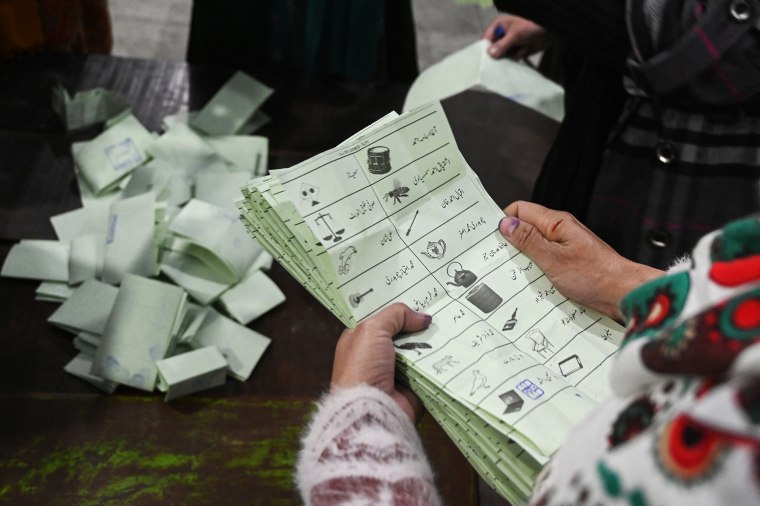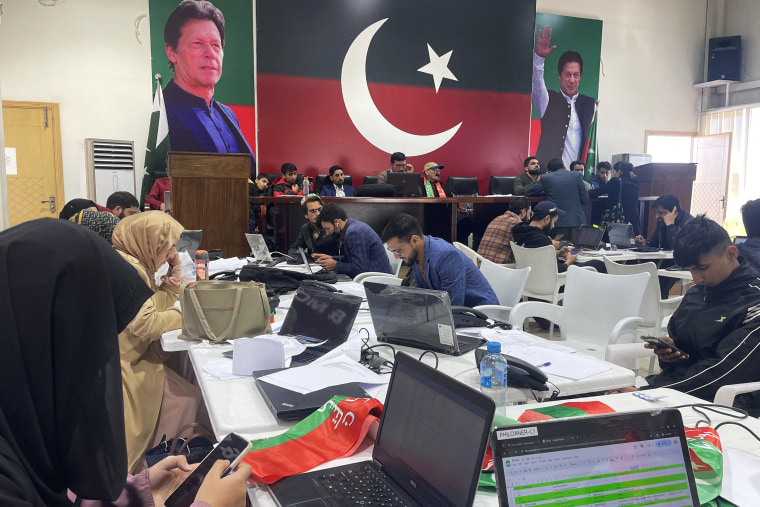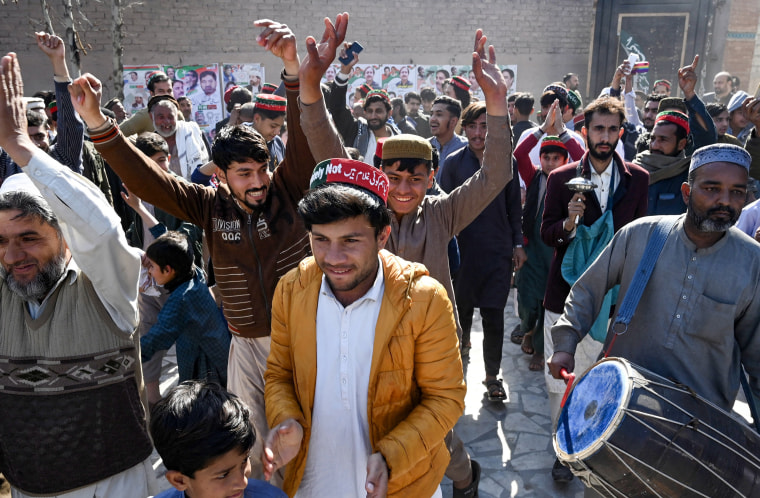PESHAWAR, Pakistan — Voters in Pakistan were still waiting for election results Friday after a surprisingly strong showing by supporters of jailed former Prime Minister Imran Khan, leading to accusations of rigging amid unusual delays in vote counting that officials blamed on an “internet issue.”
The South Asian country of 230 million people voted Thursday amid heightened security, with mobile services suspended and land borders closed to ensure peaceful polling after two bombings near candidates’ offices in the southwestern province of Balochistan killed more than two dozen people the day before.
The election had already been postponed for months, leaving nuclear-armed Pakistan in the hands of a caretaker government as it grapples with an economic crisis and a surge in militant violence. Though the country’s election commissioner had said the results would be out early Friday, as of Friday evening only 156 of the 265 directly elected seats being contested in the National Assembly had been announced.
The results so far have independent candidates, some of them associated with Khan, in the lead, despite what his supporters say are unprecedented efforts by Pakistan’s powerful military, also known as the establishment, to keep him and his Tehreek-e-Insaf (PTI) party out of power. Though the military denies that it interferes in politics, voters going into the election expressed a lack of trust in the outcome.
The U.S. government expressed concern about the election-related violence and restricted communications, as did the United Nations, which warned earlier of a “pattern of harassment, arrests and prolonged detentions” of PTI leaders and supporters.
Khan’s party has accused Pakistani election officials of manipulating the results after some of their candidates gained an early lead Thursday night, describing it in a post on X as “an utter disgrace & a brazen theft of the nation’s mandate.”
The Election Commission did not respond to a request for comment Friday.
A populist and two political dynasties
Muslim-majority Pakistan has been directly or indirectly ruled by the military since it became an independent country in 1947. Khan, 71, a former cricket star turned populist politician, was elected in 2018 with the military’s support, before falling out with it later. In April 2022, he was ousted in a parliamentary vote of no confidence, and he has been trying to stage a comeback ever since.
“Imran Khan remains arguably the most popular politician in the country, but there’s been an effort to try and purge him and his party,” said Chietigj Bajpaee, senior research fellow for South Asia in the Asia-Pacific Program at Chatham House, a think tank in London.
He added that the delay in vote counting “obviously raises questions regarding the legitimacy of the whole electoral process.”

Khan has remained popular even as his troubles have mounted, and his arrest last May on corruption charges set off days of violent protests by angry supporters. He faces about 150 criminal cases, proclaiming his innocence in all of them, and is appealing his conviction in a corruption case last year.
Over the course of five days last week, Khan was also sentenced to 10 years in prison for revealing official secrets, 14 years for corruption and seven years for marrying his wife too soon after her divorce in violation of Islamic law. Khan’s lawyers say he will also appeal those convictions, which have left him ineligible to hold office.
At the same time, members of Khan’s party say they have been subject to an intense military-backed crackdown, driving them to resign or go underground. The PTI was effectively banned last month when the Pakistani Supreme Court ruled that it could not use its traditional electoral symbol, a cricket bat — which for many supporters would have been the only way to identify the party on the ballot in the vast rural parts of the country where many are illiterate.
Khan’s convictions and the crackdown on his party seemingly cleared the way for his rival, Nawaz Sharif of the Pakistan Muslim League-Nawaz, to return to power. Sharif, 74, a three-time former premier whose brother Shehbaz Sharif became prime minister after Khan, returned to Pakistan in October after four years in self-imposed exile abroad to avoid serving prison time for corruption. Since then, Pakistani courts have overturned his two convictions.
But Sharif’s relationship with the military is also tenuous, Bajpaee said.
“He’s frankly at the present time seen as the lesser evil to Imran Khan, who is seen as more unpredictable and volatile,” he said.
The outside candidate is Bilawal Bhutto Zardari, the 35-year-old son of assassinated former Prime Minister Benazir Bhutto, who ran for the center-left Pakistan People’s Party (PPP) founded by his grandfather, Zulfikar Ali Bhutto, Pakistan's first democratically elected prime minister who was overthrown and executed by the military.
Supporters cited Khan’s charisma among their reasons for voting for him Thursday.

“Most people voted for Imran Khan as they felt most empowered in supporting him,” said Irfanullah Khan, a 35-year-old in the Mardan district of Pakistan’s Khyber Pakhtunkhwa province who like other voters NBC News interviewed is unrelated to Khan but shares his highly common surname.
“He has masterfully exploited things which are missing in people’s lives. This, in turn, makes people believe that he is particularly speaking for them.”
Others appeared to be making more of a political statement. Imtiaz Khan, a longtime PPP supporter, said that this time he had voted for Khan’s PTI, and that “the way people came out to support them is in fact a reaction of the people against the Pakistani establishment and its policies.”
“They bring people into power and then send them home unceremoniously when they turn against them and their interests,” Khan, a farmer, said.
The PTI leader also has his detractors such as Islam Khan, who said the former cricket player was “not a mature and positive politician.”
“Rather than focusing on governance and people’s problems, he spent his energy and state resources on sending his political rivals into jails and caused a huge backlash,” said Khan, an engineer who voted for Sharif, citing his experience and economic policies.
Others, like business owner Mukhtiar Khan, said they saw Khan as the least objectionable choice.
“I don’t think he is the perfect person,” he said. “But he is the only hope for millions of Pakistanis, as we have seen all other politicians.”
Mushtaq Yusufzai reported from Peshawar, Pakistan, and Mithil Aggarwal reported from Hong Kong.

